#Yalta rest
Explore tagged Tumblr posts
Text
"For the first 117 years of the nation's existence, Presidents never ventured far. Unsure of the legality of being "President" outside the country, the first century of Presidents carefully remained within the nation's borders. William McKinley agreed in 1901 to meet the Mexican President, but on the border of the two countries. It wasn't until Theodore Roosevelt's trip to Panama in 1906 that a President ever traveled internationally -- and he did so as quickly as possible, sprinting aboard a U.S. Navy ship to the Canal Zone and remained out of territorial waters for only ten hours...
FDR's journey by lumbering Pan Am Flying Boat from Miami to Casablanca made him the first President to travel by air, to fly abroad, and the first to set foot in Africa. Ironically, the President flew because the Secret Service and the military deemed it safer than facing the marauding Nazi U-boats in the North Atlantic. It was a difficult and time-consuming trip: four legs of flying, three stops, and three days' travel each way. All told, FDR spent nearly ninety hours in the air for a trip that today Royal Air Maroc accomplishes in about eight hours. That journey gave rise a few weeks later to the Army Air Corps' decision that the President should have his own airplane. For the long flight to Yalta in February 1945 to meet Winston Churchill and Joseph Stalin as the war wound down, Roosevelt first boarded his four-engine Sacred Cow, a DC-4 aircraft painted standard Army olive drab and heavily modified to include a spacious Presidential suite and an elevator to lift his wheelchair in and out...

[Harry S.] Truman quickly picked up the air travel habit, boarding Sacred Cow just weeks after he took office to fly home to Independence, Missouri -- the first domestic flight in Presidential history. From that moment forward, Presidents seemed to be in near-constant states of travel. Walt Disney offered to design a special insignia for the plane -- a smiling cow with a halo over one horn and an Uncle Sam top hat over the other -- and it began to be bedecked with the flags of the countries it had visited: a total of fifty-one by the time it was retired in July 1947.


When Truman's second plane, a DC-6 named Independence after his hometown, was delivered, the designers at Douglas decked it out with an eagle motif, incorporating the cockpit windows as the bird's eyes, and painted a golden beak on the plane's nose.

As the Cold War deepened, [CIA Director] Allen Dulles pushed [President Dwight D.] Eisenhower to adopt a jet plane -- it was critical, he argued, that the U.S. President be seen leading technological advances -- and the fact that [Soviet leader Nikita] Khrushchev used jet aircraft meant it was time to retire the Presidential propeller planes...
The increasingly advanced and elaborate Presidential planes were decked out with survival gear like parachutes -- always five more than the passengers it carried, in case panicky officials deployed theirs inside the cabin accidentally. When the planes flew over oceans, Navy and Coast Guard ships were stationed in advance every 250 miles on picket duty in case of trouble. Later, as aviation technology advanced, Air Force rescue planes known as "Duck Butts" would accompany the President's plane, stocked with rescue swimmers, life rafts, and medical personnel who could aid survivors if the plane went down at sea."
-- Garrett M. Graff on the early history of air travel by the Presidents and the first dedicated Presidential planes, as well as some fascinating details about security precautions for Presidential flights during the Cold War, via Graff's excellent 2017 book Raven Rock: The Story of the U.S. Government's Secret Plan to Save Itself -- While the Rest of Us Die (BOOK | KINDLE | AUDIO), which is one of my favorite books of the past 10 years.
#History#Presidents#Presidency#Presidential History#Presidential Travel#Presidential Transportation#Presidential Planes#Air Force One#Presidential Air Tavel#Presidential Transport#Garrett Graff#Garrett M. Graff#Raven Rock#Raven Rock: The Story of the U.S. Government's Secret Plan to Save Itself -- While the Rest of Us Die#Simon & Schuster#Cold War#Presidential Security#Air Travel#Planes#Aircraft#Presidential Aircraft#Sacred Cow#Independence#Duck Butts#Walt Disney#Franklin D. Roosevelt#FDR#President Roosevelt#World War II#Casablanca Conference
51 notes
·
View notes
Text
Speed Bonnie Boat
The irony has not escaped me, that Baby and I finally made it back home on the 278th anniversary of the Battle of Culloden. Of course, nothing of this was planned - how could we? it's way above our heads, literally -, but didn't we laugh, Baby and me and Shipper Mom, finally content to have all the menagerie in one place, now cracking at its seams with unpacked boxes, tchotchkes, and irrelevant shite (why did I even pack this?).
You know this land is your land, when you finally start to see this, through the windshield: the glorious canola fields of the Deep South, near the Danube - my grandma's feisty, quick-witted and generous people's territory.
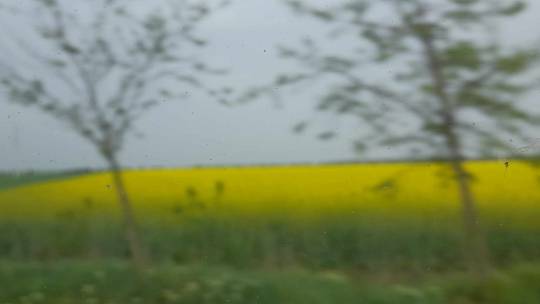
Uncharacteristically, I realized I came to Athens on a very unlikely Dubliner autumn and went back home on a very unlikely early summer April. Helps with the overall surreal impression:

All the roads leading to Rome, we can almost say "Hello, the house" in this pic. Smack dab downtown, where everything happens:
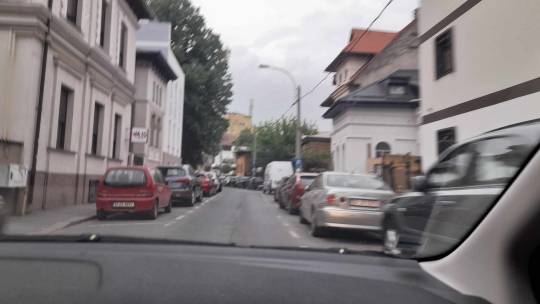
And then, the Jihad, between Lola the corgi and Baby the 'beige' (Greek passport says so) lab. This old lady is not really thrilled:
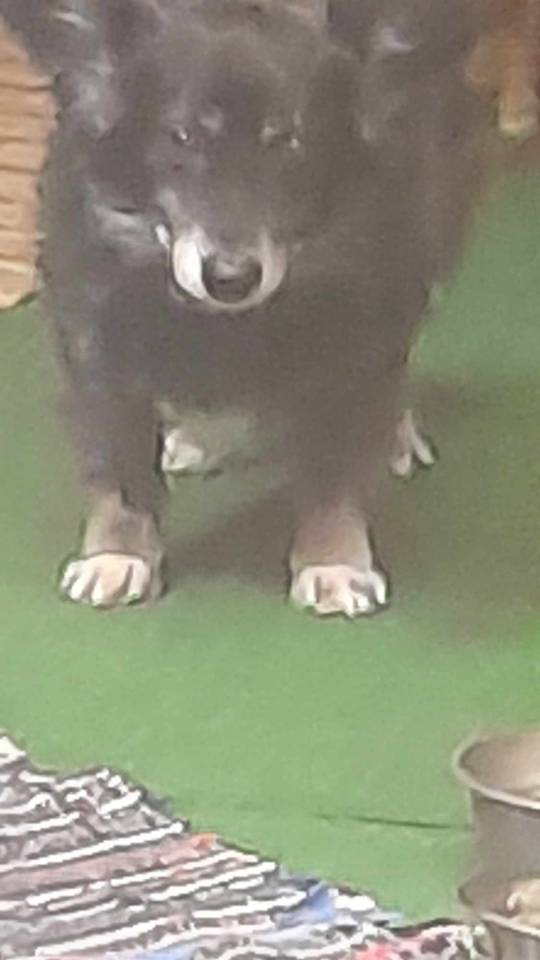
And for much of the rest of the tired, yawny human evening, the state of play was protracted war and a difficult Yalta negotiation of sorts:
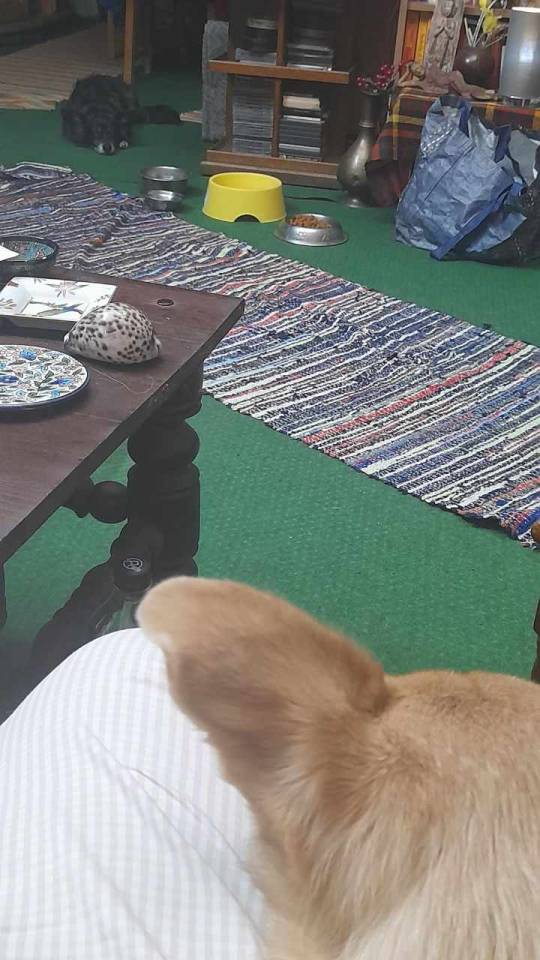
Pasha ran in the shadows of the kitchen corridor. Nothing to report yet and unable to document properly: at night, all cats are black, says the Chinese proverb.
I have roughly two months to make this happen. For now, they can work with staying together in the same room and I think the one who's going to offer a truce is the Greek. With all this, I forgot to pour myself that Laphroaig. #Silly
'Carried the lad who's born to be king/Over the sea to Skye...'
PS: To all of you who offered their warmth and thoughts and even prayers, let it be known you are deeply loved by all of us. This land is also yours, my house is your house. No questions asked. We're good people. You will always find a spot for the outlander at a Romanian table and we like them long and boisterous. Mark me.
65 notes
·
View notes
Text
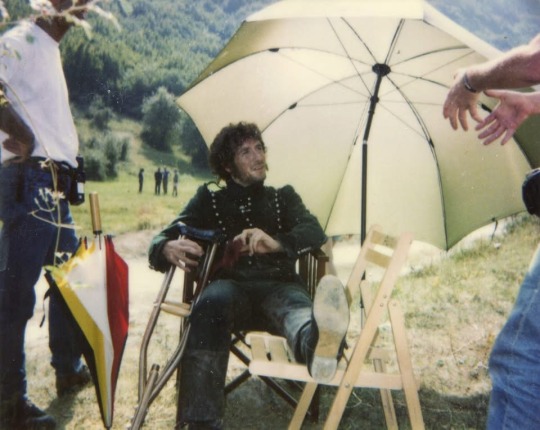
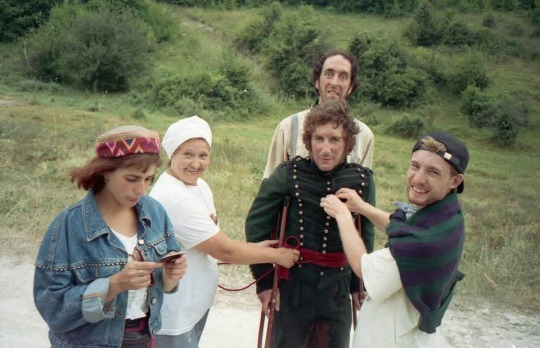
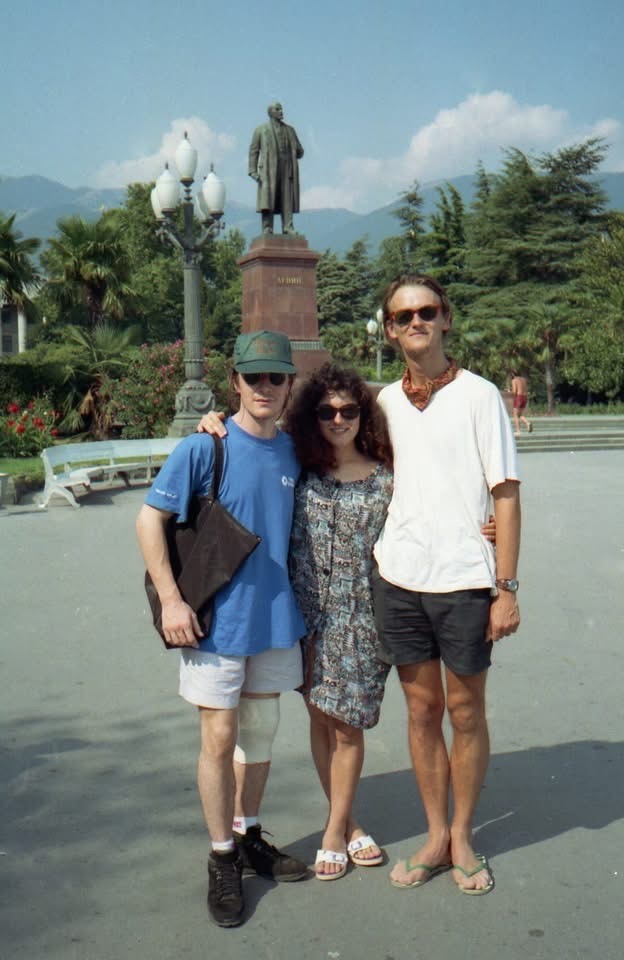
Some more from Jason Salkey’s stash of Sharpe photos. Paul resting his knee between takes, with the Ukrainian wardrobe ladies (and Michael Mears), and Diana Penalver and Paul Trussell in Yalta during a break in filming.
13 notes
·
View notes
Text
"In St. Petersburg we work, but at Livadia, we live."
Grand Duchess Olga Alexandrovna
In 1909, Nikolay Krasnov, who was responsible for the Yousupoff Palace in Koreiz, was engaged to design a new imperial palace in Livadia (before that, there had been an imperial residence in Livadia consisting of a large and a small palace used by Alexander II and later by Alexander III, who died at the smaller residence.) When Nicholas II decided to build the new palace, he also demolished the older residence but left the small palace where his father died.
The Tsar's diary indicates that the Imperial Family discussed the design; it was decided that all four façades of the palace should look different. After 17 months of construction, the new palace was inaugurated on 11 September 1911. In November, Grand Duchess Olga Nikolaevna celebrated her 16th birthday at Livadia.
The family was always the happiest at Livadia.
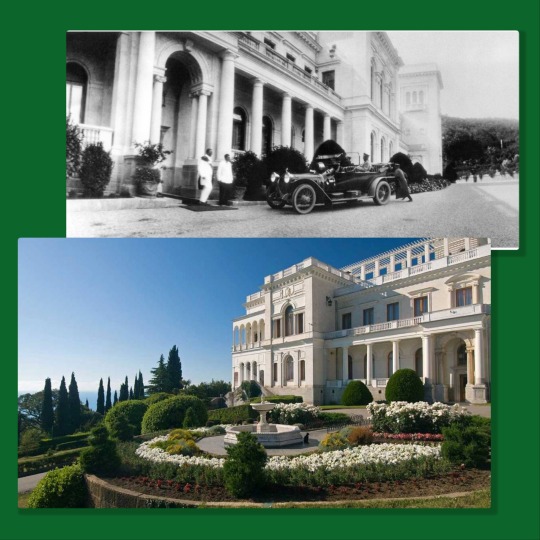
One of the Tsar's "motors" at Livadia. If you look carefully, you can see the "side of the palace" where the car is parked and the main entrance in both the contemporary colored and black and white photos.
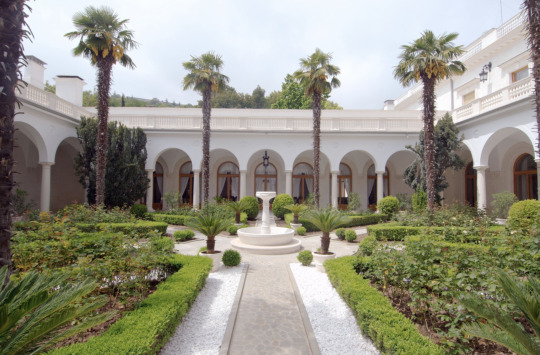
Above is the beautiful Italian Courtyard of the palace as it stands today. If you look at pictures taken when the Romanovs used the palace, the centerpiece of the courtyard was different. Today, there is a fountain at the center. Examining the older pictures (below), you can see that there seemed to be what I can only describe as a "well" at the center of the courtyard. There was a column on each side of the well. In one of the photos below, you can see Grand Duke Dmitry Pavlovich; he had his own rooms at the Livadia Palace.
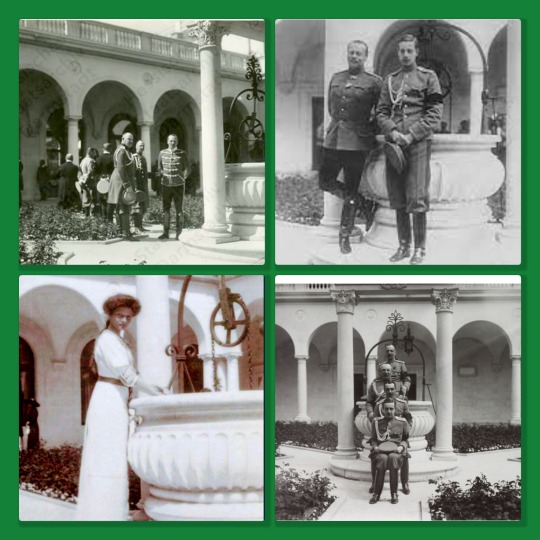
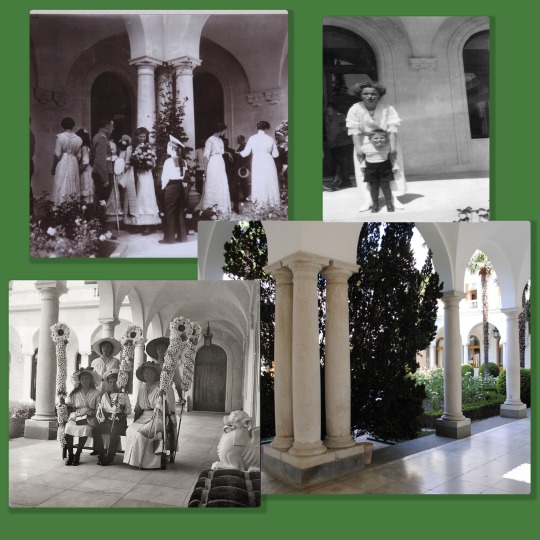
Nicholas II and his family were so at ease at Livadia that they also conducted some minor official functions in addition to family activities. When the family went to Livadia, they usually went as far as Yalta by sea; it is easy to infer that the official activities they conducted were related to the crew of the Standart. In addition, at the time, it was believed that mountain air and rest could cure tuberculosis, and there were several spas and sanatoria in the mountains in the area. The Empress and the girls visited the sick there (they also participated in other charitable activities.)
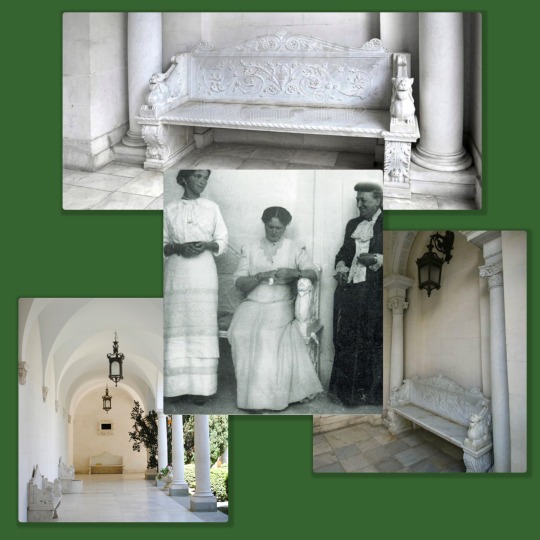


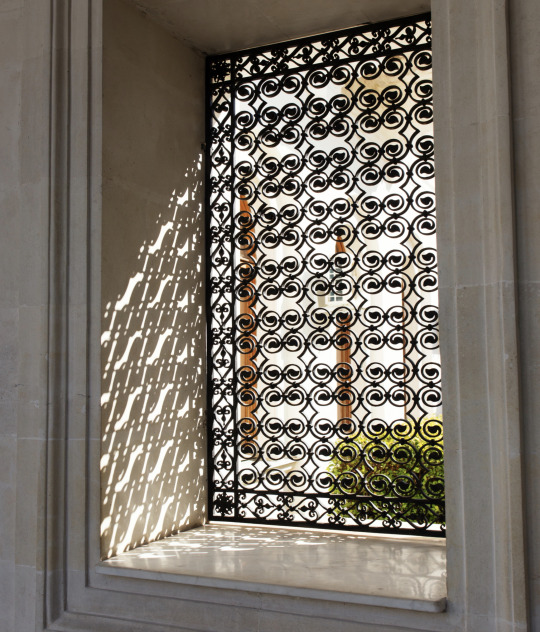
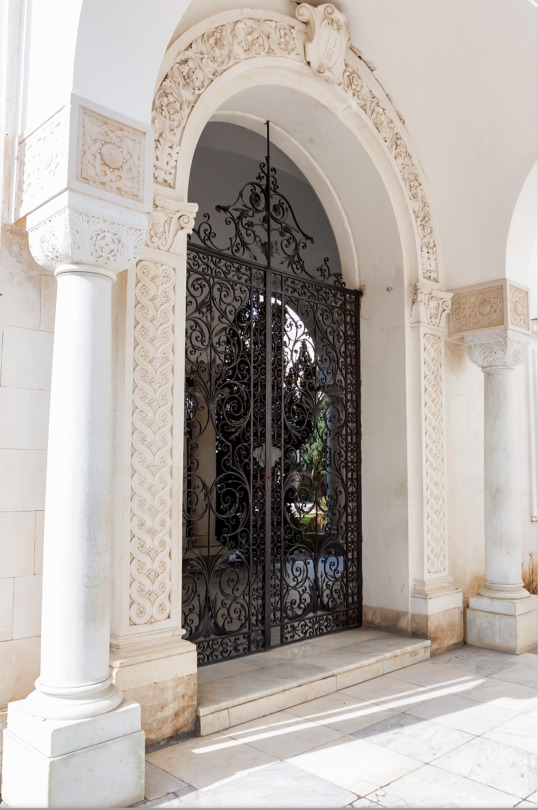
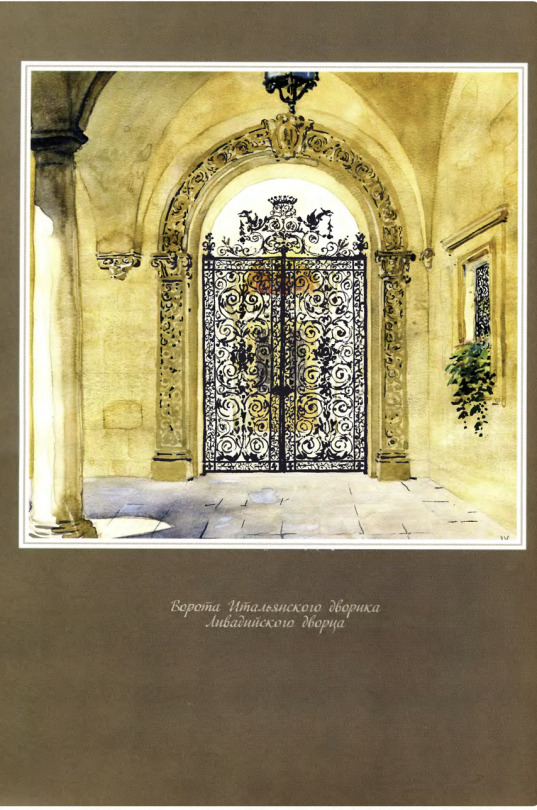
The Yousupov family gifted the beautiful door above to Nicholas and Alexandra. The painting next to it is from a beautiful book by Kravnov ("Fiftieth Anniversary of Yalta"), who worked on the palace's design (and on that of the Crimean summer residences of several Grand Dukes.) The window is also featured in the painting.
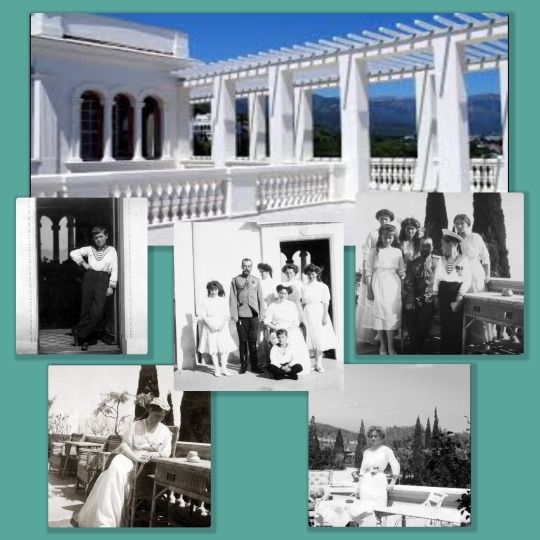
The "solarium" seems to have been a very popular area. Nicholas and his children preferred the outdoors, and Livadia seemed to provide the Empress with the perfect environment to get sun and fresh air in comfort regardless of her many ailments.
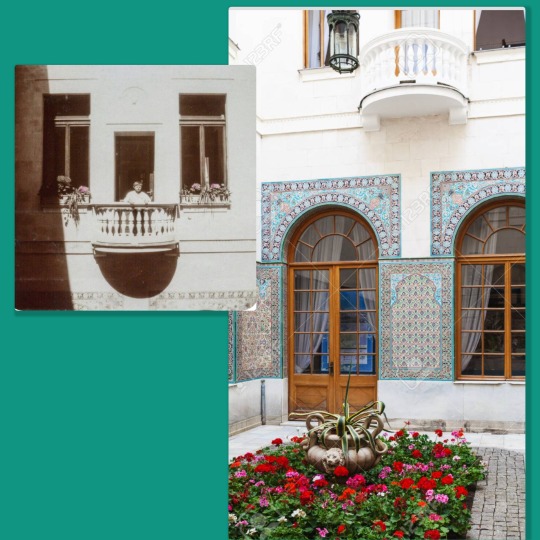
This is the "Moorish" courtyard of the palace. It is small, but notice the exquisite tilework on the walls. And, of course, the little balcony between the windows seemed perfect to Alexis for him to "address" his family.
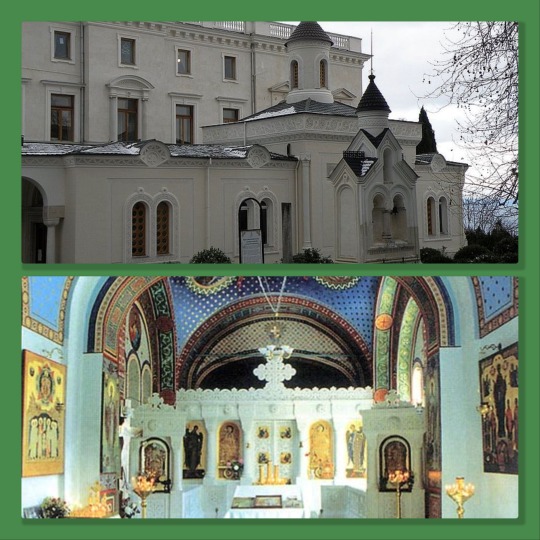
The palace had a chapel so that the Romanov family could worship in privacy.
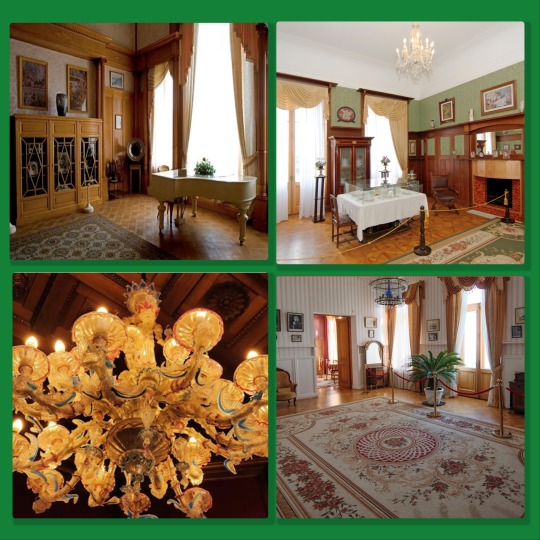
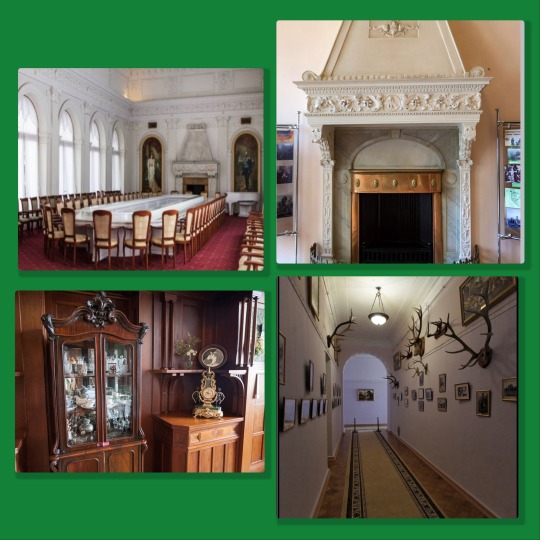
A few of the interiors of the palace. The chandelier is Murano Glass (amazing that it survived all these years.) Olga's coming-of-age celebration took place in Livadia in the formal dining room in the photograph above, dancing spilling into the flower-perfumed courtyard. That is a luxury of the type you cannot buy! The girls' rooms are currently being restored. There are pictures of the rooms as they were, but I was not sure they were from Livadia, so I did not include them.
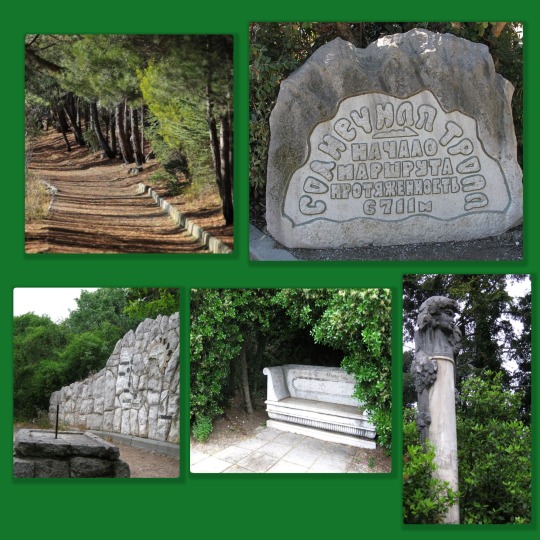
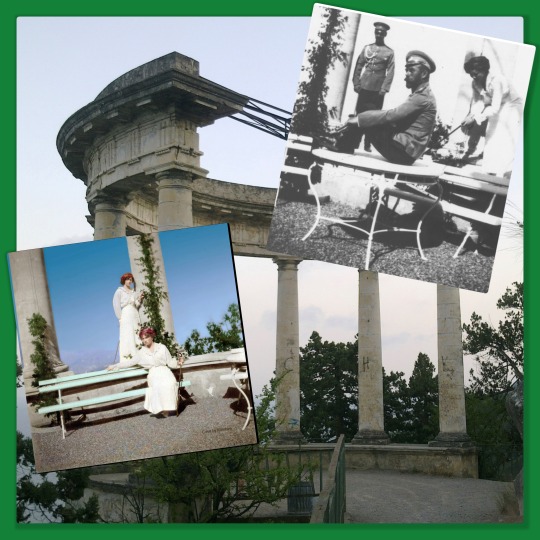
Finally, some photos of the "Tsar's Path" (or Sunny Path), which exists to this day (it goes from Livadia Park to the city of Gaspra.) The family loved to walk this path (regardless of its name, it is not sunny but pleasantly breezy). This path is on one level so that anybody can walk it, regardless of their cardiovascular status. I have read two stories about how it "emerged," and as usual, the truth is probably in the middle. First story: The new Livadia Palace did not exist yet, but the Romanovs used the old palace and always loved coming to Livadia. Alexander III kept gaining weight, and his doctor recommended that he walk but not overdo it...so Alexander had the path leveled. The path's beginning and end differed from what they would be later. Second Story: Sandro had the path from Ay Todor toward Livadia built because Nicholas and Sandro's families always visited each other (they started calling it the Prince's Path.) Nicholas loved the idea and extended the path.
Today, the main path remains, and other routes to other small towns can be hiked from it. Many of the same benches and sculptures are where they were at the time of the Romanovs.
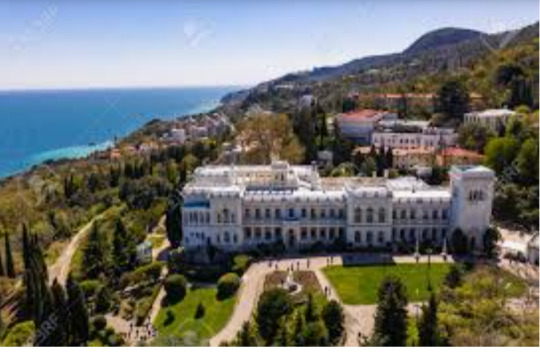
Just one last photo. Here, you can see how close the palace is to the mountains and the sea. A beautiful big house full of fresh air and light with flowers perfuming the air. No wonder Olga liked it so much! (gcl)
#russian history#romanov dynasty#nicholas ii#otma#Empress Alexandra Feodorovna#Emperor Alexander III#Grand Duke Alexander Mikhailovich#Ay Todor#Nikolay Krasnov#grand duchess olga nicholayevna#Grand Duchess Tatiana Nicholayevna#Grand Duchess Maria Nicholayevna#Grand Duchess Anastasia Nicholayevna#Tsarevich Alexei
64 notes
·
View notes
Text
Arrival of Emperor Nicholas II and Grand Duchess Maria Nikolaevna in Alupka. September 22, 1913.
Nicholas wrote in his diary:
September 22nd. Sunday. At 9 1/2 I went with Marie and Count Fredericks to Alupka for the consecration of the Climate Station Church [note: I am not sure how to translate it] for students of church schools. A beautifully designed large house for 80 or even 100 residents. Returned to Livadia at one o'clock. After breakfast, Alix and all the children went to Yalta for the opening of her bazaar. Took a nice walk around Orianda and along the seashore. At 4 1/2 I went to “Standard”, where Alix had already arrived to rest. After tea I received Sabler with an additional report. We had lunch on the yacht, the children went to the market, and we returned to Livadia. 22-го сентября. Воскресенье. В 9 1/2 поехал с Мари и гр. Фредерикс(ом) в Алупку на освящение церкви Климатической станции для учащихся церковных школ. Прекрасно устроенный большой дом на 80 и даже 100 жильцов. Вернулся в Ливадию к часу. После завтрака Аликс со всеми детьми поехала в Ялту на открытие своего базара. Сделал хорошую прогулку по Орианде и по берегу моря. В 4 1/2 поехал на “Штандарт”, куда Аликс уже прибыла, чтобы отдохнуть. После чая принял Саблера с дополнительным докладом. Обедали на яхте, дети отправились на базар, а мы возвратились в Ливадию.
20 notes
·
View notes
Text
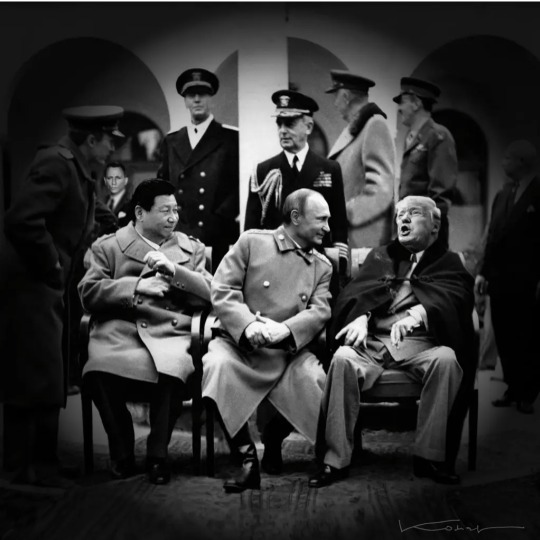
New Yalta
The world now rests in the blood soaked hands of three Dictators - Xi, Putin and Trump. Lord help us...
2 notes
·
View notes
Text

Dove of Peace by Picasso
* * * *
World peace is not a party question. [...] The structure of world peace cannot be the work of one man, or one party, or one Nation. It cannot be just an American peace, or a British peace, or a Russian, a French, or a Chinese peace. It cannot be a peace of large Nations- or of small Nations. It must be a peace which rests on the cooperative effort of the whole world. It cannot be a structure of complete perfection at first. But it can be a peace—and it will be a peace—based on the sound and just principles of the Atlantic Charter— on the concept of the dignity of the human being—and on the guarantees of tolerance and freedom of religious worship. [...] We shall have to take the responsibility for world collaboration, or we shall have to bear the responsibility for another world conflict. [...] Peace can endure only so long as humanity really insists upon it, and is willing to work for it—and sacrifice for it.
—Franklin D Roosevelt, Address to Congress concerning the Yalta Conference, Mar 1, 1945
13 notes
·
View notes
Text


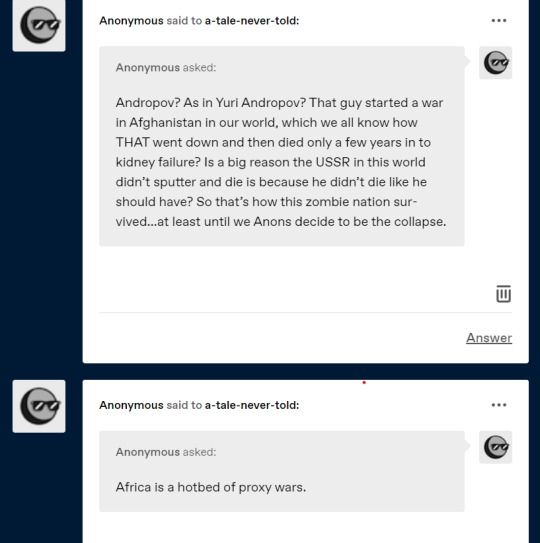
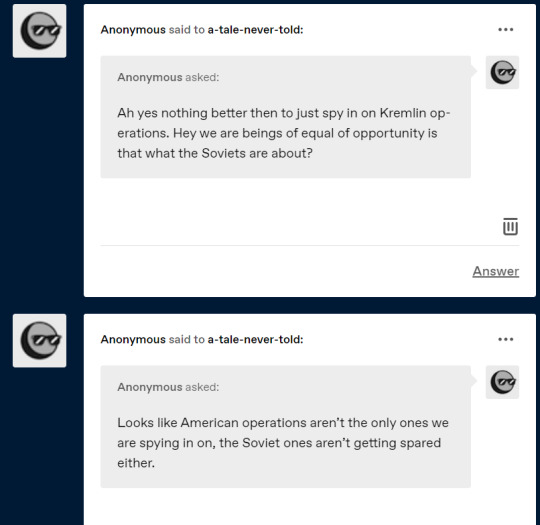
Yalta, Union of Soviet Socialist Republics, 1030:am August 31st, 2012.
*As a Gaz 13 Chaika limousine drives down the mountain roads to its destination, one man is preparing himself. He is wearing a business suit with a fedora, has small eye contacts, a little mustache, and a briefcase. This is Shinjo Nomuri, the general secretary of the Communist Party of North Japan*
*Nomuri had been earlier confronted from the airport by a few Kgb guards, who said that their boss asked for a meeting with Shinjo and that he sent them to pick him up. Shinjo went alone quietly, fearing they would kill him if he tried*.
*Eventually, they reach the destination, a huge Dacha that is with a Lenin statue standing in front of the entrance and all the other cars parked near the clearing. Watchmen and Security armed with AKM assault rifles and Mosin Nagant Rifles watch closely at the car.*
*One of the men steps out of the car, a Kgb escort, and looks at Shinjo*.
Kgb guard: Мы прибыли, сэр. Выйти из машины ( We've arrived sir, get out of the car)
*Shinjo nods and steps out of the limo, escorted by Kgb. One of the guards looks at the security and waves his hand at them. Upon seeing the Signal, they let him through*
*They enter inside the hallways of the Dacha and proceed to walk to the office. Inside the hallways lining them up are pictures and paintings of famous hallmarks of Soviet history, such as the 1917 October Revolution, a Stalin-era building of the 1930s, and the Soviet flag being hoisted on the Reichstag. the detonation of the first Soviet nuclear device, a scene of Sputnik 1 in space, Yuri Andropov giving a speech to a crowd of Kazaks in the Kazak SSR, and more*
*Eventually, they reach the office where the front entrance is guarded by two Kgb guards wielding assault rifles. The escort looks at the guards as they proceed to check if they have any weapons hidden in the suit *.
Kgb guard : Он с нами. Товарищ Николай просил о срочной встрече с ним ( He's with us. Comrade Nikolai requested to see him for something urgent)
*One of the guards looks at Shinjo intently and then goes inside the office for a bit. A few minutes pass untill the guard comes out of the room*
Kgb guard: Товарищ Николай попросил пригласить его. ( Comrade Nikolai has asked to send him in)
Kgb guard: Понял ( Understood)
*With that, the guards pass so that the door is opened by the escort. entering the office. Behind the desk, is a portrait of Leon Trotsky, while the rest of the room has two paintings depicting the Soviet countryside. Sitting at the desk signing papers, is a 6ft skinny yet well-built tall man wearing a Soviet officer uniform, with his black hair and surprisingly youthful face concentrated on signing the documents*
Nikolai: Господин Генеральный секретарь, присядьте, пожалуйста.( Mr. General Secretary, have a seat please)
*Shinjo does as asked and proceeds to take his seat thus kickstarting the meeting*.
2 notes
·
View notes
Text
So… is it over? And the surprising player that is holding the cards...
Franklin Roosevelt pressed the red emergency button to stop the elevator on the way down to his private dining room. The King of Saudi Arabia was waiting for him, but the President wanted to smoke a couple of cigarettes first.
It was 11:30 in the morning on Valentine’s Day, 1945. World War II was nearing its end, and Roosevelt had just come from the famous Yalta Conference with Winston Churchill and Joseph Stalin to discuss what post-war Europe would look like.
But on the way back home, Roosevelt went out of his way to meet with the Saudis. Legendary amounts of oil had been discovered in the Arabian desert a few years before and knew that such vast energy reserves would be strategically important to the United States after the war.
The problem was that Roosevelt was on death’s door at that point. His doctors had urged him not to go, but the President overruled them, sensing that the trip would solidify American interests.
He was right– it was a critically important trip. But the doctors were right too– it was obvious the trip had taken its toll, and a senior aide described FDR as “helpless in fatigue”.
The quick smoke break on his way to the lunch meeting was Roosevelt’s quick moment to relax, gather his wits, and put his game face on before taking on King Abdulaziz.
Apparently, the cigarettes did the trick, because Roosevelt was able to summon enough strength to build great rapport with the King.
As US Marine Colonel William Eddy (who was present at the meeting) later described, “the King and the President got along famously together” and became fast friends.
Roosevelt and Abdulaziz discovered they were the same age, both deeply interested in agriculture, and even shared similar physical handicaps. In fact, Roosevelt gave one of his own wheelchairs to the King as a goodwill gesture, which Abdulaziz later recalled was “my most precious possession [from] my great and good friend President Roosevelt.”
Roosevelt died less than two months later. But he had planted the seeds of a relationship with Saudi Arabia that soon became very important… and eventually critical to the United States.
In the 1940s and 1950s, the US economy grew leaps and bounds and had an insatiable appetite for energy; Saudi oil played a key role in fueling that growth, and both nations prospered from the relationship.
Their amity was put to the test in the 1970s when the US dollar was taken off the gold standard. World leaders revolted, and the dollar’s standing as the global reserve currency could have ended very quickly.
But Saudi Arabia stuck with the dollar. And in 1974, the two countries inked a new economic cooperation deal: the US would provide security and technology, and the Saudis agreed to maintain their currency peg to the dollar… which ultimately meant that oil would still be sold exclusively in US dollars.
If the Saudis had gone the other way and abandoned the dollar, America could have lost its global financial dominance by the end of the 1970s.
Instead, Saudi Arabia’s commitment encouraged (and realistically forced) the rest of the world to continue to hold US dollars, even if just for the sole purpose of buying oil from OPEC.
As a result, the US dollar has remained the global reserve currency through this day– which is the ONLY reason why America can have a $36+ trillion national debt or run multi-trillion-dollar deficits each year… and yet the world keeps buying US government bonds.
Saudi Arabia could now be poised for another big decision that will have a major impact on America’s future dominance.
But first– as of today, it appears that the Trump administration may be climbing down from hard-nosed positions they had adopted as recently as Monday.
Suddenly now the President doesn’t want to fire Fed Chairman Jerome Powell. Suddenly the gazillion percent tariffs on China are “too high”. Suddenly Elon thinks that he is spending too much time at DOGE.
Granted, all of this could change by the time I finish writing this article. Such are the times in which we live. However, it seems that the administration is feeling the pressure from the bond market rout, the stock market rout, the currency market rout.
It’s all very Truss-ian, i.e. reminiscent of 2022 when then-British PM Liz Truss had to resign after domestic financial markets crashed and investors vomited all over her economic plan.
Obviously, the guys in the US aren’t going to resign. But it appears that they’re capitulating to investors’ demands: “Go back to the way things were in March… keep hitting the woke universities, keep policing the border, keep doing all the other stuff. Just leave trade alone.”
So, is the economic war already over? Who knows. But even if they really are backing down, it remains to be seen if the rest of the world will simply forget about the past month and move on.
How much trust and confidence will other nations continue to have in the dollar, and in the United States? Already, over the past several years, there has been serious effort from the Usual Suspects (i.e. Russia, China, Iran, etc.) to de-dollarize.
Some of their efforts have been laughable. Others have made great progress.
And Saudi Arabia may once again be the key swing vote.
Saudi’s Crown Prince, Mohammed bin Salman (MBS), knows his kingdom’s oil will eventually run out, and he’s desperately seeking to build a real economy to replace it.
On one hand, Saudi Arabia has a longstanding relationship with the US– though one that has clearly soured over the years. On the other hand, he has the Chinese offering all sorts of cash and prizes.
China knows that the petrodollar, i.e. selling oil in US dollars, is a key driver for global US dollar demand… which props up the US government and supports America’s gargantuan national debt.
Chipping away at that dollar demand will really hurt the United States. China wants this to happen. And they’ve been pushing Saudi Arabia to start selling oil in Chinese yuan, i.e. petroyuan.
Bottom line, MBS is going to have to make a decision about whether partnership with China or the US is better for his kingdom over the next several decades.
If he sticks with the US and rejects Chinese overtures, it will go a long way in keeping other countries in line, eliminating doubts about America, and maintaining the dollar as the reserve currency– for now.
On the other hand, if he decides that China is the better option and starts selling oil in yuan, it could be crippling for the US economy.
Foreigners holding trillions of US dollar assets would no longer need to maintain such vast dollar reserves. The dollar would plummet as a result, US government bond yields would skyrocket, and inflation would surge.
Saudi Arabia is holding a lot of cards right now regarding the fate of the dollar… which is a key reason why Donald Trump himself is heading there in a few weeks.
Make no mistake– this is a monumental story in the making.
0 notes
Text
Jour 8
Ce jour, je le consacre à l'identité culturelle arménienne... Que peut bien cacher ce titre ronflant? Et si j'abordais un faiseur de croix?
Les croix en pierre, nommées Khatckar, sont des prodiges ancestraux d'entrelacement, et surtout l'un des symboles qui affirme l'identité de ce pays. Je découvre Hambik dans son atelier que bien sûr j'ai eu du mal à trouver. Qui peut se douter qu'au rebord de l'élégante allée pleine de fontaines aux jets variés, qu'entre les kiosques premium, qu'entre les élégances actuelles et bruyantes, sur le bord du trottoir, de l'autre coté du nouvel immeuble audacieux, en fait, se cache un quartier très ancien et totalement invisible du promeneur qui, trop attiré par les vertiges du neuf, ne peut distinguer la muraille en bois protégeant l'intimité des irréductibles.
"C'est nouveau toute cette merde. Moi j'ai grandi ici, et tout le monde se connaissait et toutes les maisons étaient sans étage. Erevan s'est inversé. Les vrais habitants sont tous partis soit à Los Angeles soit dans les villages. Mais mon atelier, je le garde ici. Mon père faisait des croix. Je continue. Regarde, une seule croix pèse 800kg. Celle là va partir en Amérique. Il y a longtemps, je suis entrée au séminaire. Je voulais être Katolikos, le pape de l'église arménienne. Puis j'ai vu que les textes servaient juste à contrôler les personnes. Puis ils ont eu peur alors ils m'ont expulsé. Mais les prêtres continuent de venir me voir. Mais je dit à tout le monde que ce sont des menteurs. Et je fais des croix. Je ne travaille pas... en fait, je m'amuse. Ah, voici ma seconde femme, tu as vu ma première épouse. Mon désir est d'avoir 7 enfants. Par les temps actuels, une femme ne suffit pas pour ce projet donc j'en ai 2. Oui, au début ce fut compliqué mais maintenant c'est accepté. Et j'ai déjà 2 enfants. Lora est enceinte.
... Bonjour Lora, dis je à la belle sortie d'un film des années 30.
... Lora : d'où je viens? Je suis née à Yalta donc en Union soviétique, puis je suis devenue ukrainienne et comme j'habitais en Crimée, je me suis transformée en russe. Non je n'ai pas fui. Je suis ici car j'aime ce pays, je ne sais pas pourquoi, mais oui....
... Hambik: tout n'est que mensonge sauf ce que je fais de mes mains et c'est pour cela que chacune de mes croix est unique.
Faire par ses propres mains, voilà ce que je désire répandre auprès de la nouvelle génération, m'explique Koryun.
Lui, il est analyste financier. Il travaille 4 à 5h dans ce domaine, puis il descend tout en bas pour participer à la gestion du projet d'éducation artistique qu'il a lancé il y a 15 ans.
Faire par ses mains sinon toute notre identité va disparaitre. Il ne nous reste que ça. Maintenant, les écrans attaquent nos traditions. Tout devient pareil partout. C'est un grand danger. Mais avant, les Turcs nous ont massacré. Aujourd'hui, les azéris veulent nous détruire. Avant, Staline a voulu enterré nos musiques et nos danses. Mais en secret, les anciens ont conservé la mémoire.
Une de mes équipes a d'ailleurs recueilli de nombreux chants dans les villages. Tiens, voici un livre pour toi, avec des chants et avec le QR code tu as l'audio. C'est fait par les mains des élèves. On a des professionnels qui viennent les aider.
Le prototype de cours d'art inclus dans ce collège, tout ce que je te montre, c'est pour prouver au gouvernement que c'est possible, que cela a des résultats et que l'on peut répandre le programme dans toutes les écoles.
Nous on veut élever les âmes par la culture. On veut transmettre la beauté de nos chants, de nos histoires... Les actualiser.
Nous ne sommes pas des conquérants. Nous voulons juste vivre tranquillement.
Qu'est ce qu'ils ont les politiciens à vouloir nous forcer à haïr notre voisin? C'est eux qu'on devrait abattre!
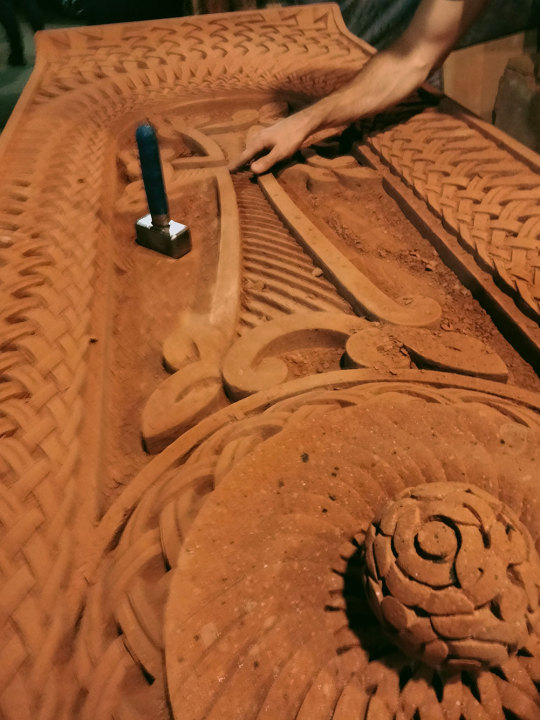
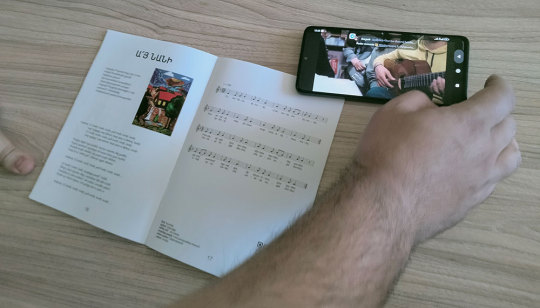
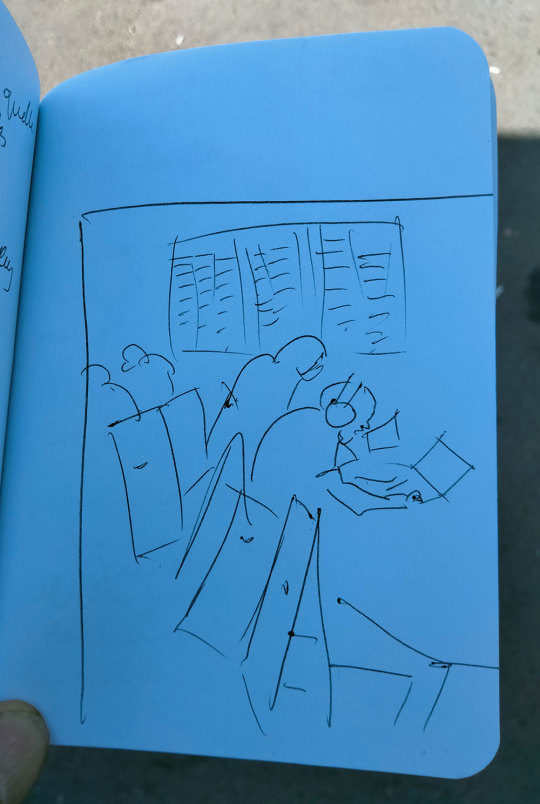
0 notes
Text
Inflexibilité persistante : la page indomptable du Likoud .
Malgré l'échec de la communauté internationale depuis le début du conflit actuel à trouver l'esquisse d'une solution, ne serait-ce qu'avec une orientation visant à prévenir une escalade extrême dans l'ensemble de la région du Proche-Orient, il faut dire que le texte prudent proposé par Malte, qui a fini par s'imposer, a réussi à naviguer au milieu d'une paralysie atroce du Conseil de Sécurité depuis l'annexion de la Crimée par la Russie en 2014, une situation qui perdure et s'aggrave toujours.
Depuis environ une décennie, le système international semble être en état d'agonie de plus en plus ressentie.
Aucune résolution de l'ONU n'a pu être adoptée en 2022 pour condamner l'invasion russe d'une partie de l'Ukraine, ni pour dénoncer les bombardements massifs de la population civile à Gaza par les Israéliens. La guerre se poursuit alors que le droit international ainsi que le système international laissent à désirer. Dans cette situation de fragilité du normativisme sur la scène internationale, la dramatisation atteint des sommets. La brutalisation s'accompagne largement d'une hyper-victimisation. Les Russes affirment mener une guerre contre les nazis en Ukraine, tandis que les Israéliens comparent le Hamas aux nazis.
Cette légèreté dans la manière dont la mémoire du national-socialisme allemand est reprise de manière généralisée, sans considération appropriée, est très symptomatique. Cela contribue à créer un effet analogique avec la situation qui prévalait à la veille de la Deuxième Guerre mondiale. Cependant, le système international qui a été mis en place à la fin de cette guerre, lors des conférences de Yalta et de Potsdam, semble plus obsolète, périmé et dysfonctionnel que jamais. Pourtant, des alternatives ne semblent en aucun cas être à portée de vue.
Le monde se retrouve maintenant pris en étau entre une guerre prolongée en Ukraine, qui pourrait durer de nombreuses années encore, et une guerre massive contre Gaza. Les mécanismes de freinage et les garanties pour éviter l'extension de cette guerre et sa généralisation dans un conflit total et régional restent insuffisants.
Les deux conflits menés simultanément à présent l'un en Ukraine l'autre au Proche-Orient flirtent sérieusement avec la logique du choc des civilisations, à condition de pouvoir facilement échanger l'étiquette de civilisation contre celle de barbarie. Dans les deux cas, l'Occident est impliqué dans une confrontation avec une partie d'une autre civilisation. Cependant, si par rapport à la guerre russe en Ukraine, une partie du monde, soit le "Rest" par opposition au "West" semblait plus ambiguë et hésitante, dans le conflit actuel, la division est plutôt présente au sein dans ce 'Reste' globale.
En Inde, on peux mieux constater qu'Israël a réussi à gagner le soutien d'une partie du Sud Global, comprenant l'Inde de la Hindutva ainsi qu'une variété de pays africains subsahariens.
Cependant, le consensus occidental en faveur du soutien à Israël est destiné à être érodé par des dissensions internes avec le temps, même si la principale limitation de cette solidarité occidentale envers l'État hébreu provient de la droite au pouvoir en Israël même. Celle-ci n'aspire surtout pas à se retrouver dans une situation où l'après Hamas à Gaza lui imposerait un engagement dans un sens redonnant vie à la solution des deux États.
Une pacification consentie par la communauté occidentale, même si elle est réalisée par des moyens des plus brutaux, est à craindre et à rejeter par cette droite, car elle pourrait lui imposer des concessions susceptibles d'attiser la suspicion, et ultérieurement, de conduire à une confrontation avec la société des colons en Cisjordanie, qui représente, y compris pour le Likoud même, le potentiel d'un autre Hamas.
Au cours de la dernière décennie, Israël a semblé snober l'Occident et éprouver une méfiance envers ses élites au pouvoir.
Ses dirigeants et meneurs d'opinion ont critiqué inlassablement le
droit-de-l'hommisme européen, réagissant comme outragés envers l'accord sur le nucléaire iranien d'Obama, et ne se sont même pas sentis à l'aise avec le plan de paix de Trump et de son gendre!
Trump avait surpassé ses prédécesseurs dans son enthousiasme envers l'État hébreu en reconnaissant la souveraineté israélienne sur le plateau du Golan syrien occupé, malgré la résolution de l'ONU condamnant cette occupation, et en déplaçant l'ambassade américaine à Jérusalem.
Le gouvernement israélien avait cherché à promouvoir des relations diplomatiques ouvertes avec les monarchies du Golfe, tout en évitant tout engagement susceptible de conduire à la création d'un État, même s'il s'agissait d'un micro-État disséminé ou de faible envergure, dans les territoires occupés en 1967.
Puis, la guerre menée par la Russie contre l'Ukraine a surgi. Israël n'a pas suivi de manière catégorique le consensus occidental hostile à la Russie, adoptant une position ambiguë similaire à celle de nombreux autres pays du Moyen-Orient et du Global South.
L'état hébreu a évité de compromettre ses relations avec Moscou, ce qui lui a valu des critiques répétées de la part du président ukrainien Zelensky.
Soudainement, tout a changé à la suite d'attaques sans précédent et de la prise de deux cents otages. Israël s'est senti plus ébranlé que jamais, cherchant un soutien accru de la part de l'Occident, en particulier des Américains. Joe Biden a montré lors de sa visite à Jérusalem au lendemain des attaques du Hamas un engagement indélébile envers Israël, supervisant une campagne de destruction massive contre Gaza. Cependant, rien de tout cela ne pouvait remédier à la divergence entre les deux perspectives.
Pour les Américains, une fin dans la terreur est préférable à une terreur sans fin. Elle pourrait ouvrir la voie à un règlement final qui permettrait la coexistence d'un État palestinien light, d'une part, et d'un État israélien infiniment plus musclé.
Cependant, cette perspective n'est pas partagée par le Likoud. Laissez-moi expliquer. En tant que forme d'extrémisme, le Likoud incarne l'extrémisme consistant à éviter toute décision définitive.
Il refuse de trancher de manière irrévocable et de préciser les engagements mutuels nécessaires, que ce soit concernant le statut de Gaza ou celui de la Cisjordanie.
Pour le Likoud, les territoires occupés en 1967 devraient demeurer dans un état de limbes perpétuelles, figés dans un état de transition sans fin, un chantier ouvert et une grande prison.
Le Likoud n'est aucunement enthousiaste à l'idée qu'en éliminant le Jihad islamique à Gaza, on pourrait restaurer les chances d'un règlement raisonnable du conflit avec un partenaire palestinien plus raisonnable. Ce que le Likoud s'efforce de prouver depuis deux décennies, sans relâche, c'est qu'un tel partenaire n'existe pas et n'existera pas. Ceux de Ramallah sont trop mous, même à son goût, ceux de Gaza sont trop brutaux et nihilistes.
Le Likoud est fermement convaincu que rechercher un partenaire palestinien pour la paix est une perte de temps et d'énergie, alors qu'il est ouvert à poursuivre des efforts de paix avec les monarchies du monde arabe.
Pour Netanyahou, tout comme avant lui pour Begin, la perspective de paix est souhaitée et considérée comme réalisable avec les pays arabes, mais sans la nécessité d'inclure les Palestiniens dans ce processus.
Cette perspective visant à atteindre la paix sans impliquer les Palestiniens porte la plus grande responsabilité dans l'actuel enlisement sombre et sanglant.
Pour le Likoud c'est exactement le contraire: éliminer le Hamas pourrait ouvrir des opportunités pour la paix avec les monarchies, à condition de ne pas risquer la création d'un État palestinien. Pour le Likoud, éviter toute concession aux Palestiniens est crucial afin d'éviter tout affrontement potentiel avec les colons de Cisjordanie.
Ces colons incarnent à la fois l'extension de l'État et une situation de non-État, voire d'anti-État. La perte de contrôle sur ces colons est une préoccupation majeure en Israël. Pour l'aile droite du sionisme, notamment pour le sionisme révisionniste, un Israël sans la Cisjordanie demeure un État incomplet, un État hors de soi-même. En revanche, pour le Likoud, la Cisjordanie ne doit ni être pleinement annexée à Israël ni être cédée aux Palestiniens. Elle est plutôt un laboratoire permanent où la société des colons est appelée à changer la donne, un processus exigeant plusieurs générations.
Cependant, ces colons ont développé un sentiment de méfiance envers tous les gouvernements d'Israël, ainsi qu'envers le monopole de la violence légitime détenu par l'État. Ironiquement, ils semblent davantage soutenir le modèle milicien prévalant dans les pays de la région. Ce caractère milicien de la société des colons en Cisjordanie, combiné à une intransigeance idéologique et religieuse directement liée à une interprétation biblique d'action directe issue du Livre de Josué, pourrait nourrir les pires extravagances.
Si ces colons devaient s'inspirer de l'incident de Babri Masjid en Inde en 1992 pour entreprendre une action similaire d'escalade dans l'enceinte du sanctuaire des patriarches à Hébron (al-Khalil) ou même mettre en danger la mosquée al-Aqsa de Jérusalem, cela pourrait susciter une inquiétude dépassant largement les frontières israéliennes, pouvant potentiellement affecter le monde entier d'une rage non expérimentée jusqu'à présent.
L'incident de Babri Masjid en Inde en 1992 a été une tragédie où une mosquée, la Babri Masjid, située à Ayodhya, a été détruite par des extrémistes hindous qui affirmaient que l'emplacement était le lieu de naissance du dieu Rama. Cette destruction a déclenché des violences et des tensions religieuses majeures à travers le pays, causant des pertes en vies humaines. Certains colons extrémistes pourraient être tentés de s'inspirer de cet événement pour promouvoir leurs conceptions des choses, notamment à l'égard d'al-Aqsa, en justifiant leurs actions par des croyances mythico-historiques frustrées.
Même si la guerre se déroule à Gaza et contre Gaza, l'enjeu essentiel demeure en Cisjordanie. Pour Israël, la guerre à Gaza va se poursuivre jusqu'à la destruction de la direction militaire du Hamas. Paradoxalement, la recomposition du mouvement après le démantèlement du noyau militaire dure en question semble plus réaliste et moins hasardeuse que la résurrection du Fatah.
Quant au Hamas, jusqu'à présent, tout porte à croire que l'axe iranien, tout en inspirant d'une part la volonté et le momentum de l'escalade et en nourrissant cette vision apocalyptique de l'amplification de la lutte, n'était pas conscient de l'ampleur préméditée de l'escalade une fois mise en exécution, ce qui a surpris tout le monde.
Toutefois, ceci engendre une problématique étant donné que ladite décision a été arrêtée par la faction militaire sans impliquer préalablement l'aile politique du mouvement, opérant ainsi en doublant la substitution vis-à-vis des résidents de l'enclave assiégée
Jusqu'au 7 octobre, l'essentiel du conflit se déroulait entre les formations pro-iraniennens et Israël dans le cadre d'une guerre statique. Le Hamas a ensuite opté pour une stratégie offensive absolue, passant d'une guerre de position à une guerre de mouvement. Bien que cette action ait infligé un coup psychologique traumatisant pour Israël, elle limite les options pour contrer le rapport de force militaro-technologique qui reste largement en faveur d'Israël.
Cependant, plutôt que de se désinvestir vis-à-vis du Hamas, l'axe iranien opte pour persévérer dans une stratégie de guerre d'usure et de guerre de positions, tout en élaborant une approche opérationnelle transcendant les frontières, impliquant les entités affiliées à cet axe en Irak, au Liban et au Yémen. Mais pour le Hamas, est-il encore envisageable de rétrograder de la guerre de mouvement vers la guerre des positions ? Cela demeure incertain. Toutefois, parvenir à éliminer définitivement le mouvement demeure un défi difficile à concrétiser. Il est également nécessaire de considérer la possibilité de susciter, dans les territoires Palestiniens occupés, un mouvement similaire à celui du mouvement islamique à l'intérieur d'Israël.
Dans son ouvrage 'The Paradox of Liberation' paru en 1995, le philosophe politique américain Michel Walzer a choisi d'étudier simultanément l'évolution des mouvements de libération en Inde, en Israël et en Algérie. L'insertion d'Israël dans une comparaison avec les mouvements de libération nationale en Inde et en Algérie est sans doute révoltante pour les Arabes, en particulier pour les Palestiniens, pour qui Israël représente un fait colonial et non pas un État né d'une lutte anticoloniale, contrairement à ce que soutient la rhétorique officielle en Israël. Néanmoins, sur le plan de la représentation des choses, le sionisme s'est bel et bien présenté comme un mouvement de libération nationale, tout comme les deux autres mouvements étudiés par Walzer. Il a évolué d'une période où il était sous l'influence d'une idéologie laïque et progressiste, vers une époque marquée par la montée en puissance du sionisme révisionniste, de plus en plus imprégné du revivalisme biblique.
Cette guerre actuelle semble incapable de générer des réactions assez fortes pour inverser cette tendance, même si, en théorie, elle remet en question des décennies entières où les idées concernant les droits nationaux et la construction nationale étaient subordonnées à des dynamiques de revivalisme mythologique davantage que religieux.
De plus, le camp pour la paix en Israël a fait naufrage avant même l'avortement du processus de paix entre le gouvernement travailliste et l'autorité de Yasser Arafat.
Depuis l'assassinat d'Yitzhak Rabin en 1995, l'assassin a imposé sa logique à toute la société : aucun individu ne devrait consentir à la moindre concession sur les terres occupées en 1967, même celui qui était le chef d'État-major pendant cette guerre, sous peine de provoquer une guerre civile. Ainsi, selon cette logique, l'assassinat de Rabin aurait été un acte visant à préserver la paix civile en Israël! Le parti de Rabin, et à sa gauche, le mouvement de la paix, n'ont pas réussi à inverser cette logique ni à prouver que c'est avec la paix avec la Palestine que la cohésion sociale israélienne sera préservée.
Le mouvement pour la paix en Israël est apparu à la fin des années 70 selon trois logiques distinctes. D'abord, d'anciens officiers et des sionistes déterminés, irrités par la défaite de la gauche sioniste aux élections de 1977 face à Begin, ont commencé à envisager qu'une réponse à la droitisation d'Israël pourrait être la réalisation d'une paix avec les Palestiniens. Cette paix serait vue comme une entente entre deux mouvements de libération nationaux qui, bien qu'ayant longtemps été en opposition, se verraient contraints de conclure à une coexistence pacifique en fin de compte.
Deuxièmement, des "nouveaux historiens" et des "post-sionistes" ont entrepris une démarche inverse, choisissant de déconstruire la grande narrative sur la guerre de 1948 en tant que guerre d'indépendance et de décolonisation.
Troisièmement, certains se sont réjouis de la visite de Sadate et de son discours à Jérusalem, ainsi que de la signature de la paix avec l'Égypte, mais sont restés perplexes car le gouvernement de droite cherchait la paix avec l'Égypte sans pour autant envisager la même démarche avec les Palestiniens.
Cependant, étant donné que ces trois piliers du mouvement pour la paix ont soit fini par se désintégrer, soit subir l'isolement et le dessèchement l'un après l'autre, peut-on encore espérer voir émerger un mouvement favorable à la paix en Israël ? Je ne parviens pas à comprendre comment la guerre actuelle pourrait contribuer à cela. S'opposer à Netanyahou seul ne suffit pas à raviver une volonté pour la paix en Israël.
Israël peut-il véritablement se libérer de l'emprise de Netanyahou?
Son influence perdurera pendant de nombreuses années encore. Il a symbolisé deux facettes sur la durée. D'une part, une opposition constante à tout effort visant à mettre un frein à la colonisation en Cisjordanie et à toute tentative de création d'un État palestinien, même dans ses formes les plus souples et réduites. La seconde facette réside dans sa capacité à éviter de graves débordements, préférant des campagnes de frappes limitées plutôt que des conflits majeurs.
Pourtant, ce même Netanyahou, confronté à une protestation de grande envergure en début d'année pour avoir empiété sur le pouvoir judiciaire et sapé l'État de droit, s'est finalement engagé dans le conflit le plus destructeur mené contre les Palestiniens. Il n'est pas exempt de responsabilité dans cette guerre, étant pointé du doigt pour la passivité et la nonchalance des appareils le 7 octobre face aux attaques. La résolution de la question des otages pèse lourdement sur lui et aura des répercussions directes. Il en subira probablement les conséquences, mais continuera néanmoins d'exercer une influence bien plus significative que ce que l'on pourrait imaginer. L'ensemble de la société et l'establishment israéliens ont, d'une certaine manière, adopté une vision proche du Likoud suite aux attaques. Un netanyahouisme ambiant s'est propagé même parmi les opposants les plus farouches à Bibi. S'en détacher? Pas pour l'instant. Peut-être même pas pour cette génération.
0 notes
Text
If Donald Trump and Vladimir Putin believe in a world where Moscow, Washington, and Beijing should decide everything and the opinion of the rest doesn’t matter—they can think that way, but it doesn’t work that way. In the end, I hope, this world is not the world of Yalta, it’s not the world of 1945. … Our problem is, we’re kind of concerned that the Americans, I’m speaking of people in the US who are kind of opposed to Donald Trump but still kind of hesitant [about] what to do, feel that he’s still very powerful and they do not oppose [him]. The same might happen with quite a few European politicians who clearly oppose Donald Trump, but if they see that he’s powerful, that everything he does is kind of accepted, they might stop protesting unless it’s about them, so they will kind of give up one by one. And that’s a very dangerous situation. But I still think that sometimes real deterrence and action is the way to stop people like Trump. Learning from Russia: if you stop them, they stop.
My latest episode of This Is Not A Drill is out now, where this week Ukrainian journalist Nataliya Gumenyuk and I are discussing the fallout from the Zelenskyy-Trump Oval Office meeting, and what it means for Ukraine's future.
Available now at the link above!
30 notes
·
View notes
Video
youtube
Ялта. Приморский парк. Пляжи: Дельфин, Солнечный, сан. Россия, Ялта, Наб...,
#Yalta#beaches of Yalta#Yalta Christmas#Yalta Seaside park#beach Dolphin#beach Sunny#Seaside beach#health resort Yalta#Yalta embankment#Levant#seagulls#Yalta January 7#Yalta beaches#Yalta rest#Yalta park#Yalta bus station#Ялта#пляжи ялты#Рождество#Ялта Рождество#Рождество в Ялте#Ялта Приморский парк#пляж Дельфин#пляж Солнечный#Приморский пляж#санаторий Ялта#набережная Ялты#Ялта набережная#елка в Ялте#Ялта Елка
3 notes
·
View notes
Text
AAAAAAA I LOVE THIS 🥰🤩
Iconic people 10/10 deserves 1 million notes
RE: Ildiko Rejto
I love her, she sounds amazing. FIVE-TIME WORLD CHAMPION? That is so cool! And while having scoliosis and while being deaf? 11/10.
We have a holiday for plants! It's called Tu Bishvat, and is considered the new year of the trees: in a song it's also called "Chag Hailanot," or holiday of the trees.
I knew about Tu Bishvat, if only because I looked at one of those jewish holiday charts a while back, I did not know that it was also called Chag Hailanot however!
The Inquisition wasn't just in Spain. It followed Anusim to Latin America and other places they fled like Rome, Goa, and Portugal.
Unfortunately. I did know about Portugal however I wasn't aware of the Goa inquistion till I saw a different jewish blogger talk about it. My most recent textbook on Latin America actually went a little into some of the auto de fes in Peru and in Brazil.
Golems. Are. Not. Just. Alchemical men made of clay to be used in any fantasy book. They are defenders of the Jewish people, and typically cannot speak.
Unfortunately fantasy writers and fantasy ttrpg writers haven't gotten the memo though I'd be happy to whack them on the head with a newspaper on your (and the rest of the Jewish community) behalf.
There are Jews on almost every continent and from almost every country. Including places that you may not have thought Jews would be! Especially places where you didn't think Jews would be. There are historical communities and more modern ones, but in the end, Jews are diverse and different, again, just like everyone else.
Yes! I did know about some of that! Definitely learned about more communities while reading like the Ethiopian or Beta Israel Jews, but also about some of the Jews in China and elsewhere (Dara Horn talked about the Jews of Harbin which were predominantly Russian Jews who had moved there if I recall correctly) and the Jews from India (some of which had been there for forever others which had come escaping Spanish and Portuguese persecution.
Zionism wasn't founded with Herzl. In fact, the longing to return home has existed ever since the diaspora became a thing - and Jews have continuously lived in/returned to the land of Israel throughout the millennia. Dona Gracia Mendes, a badass Jewish lady in the sixteenth century, actually got a lease on Teveriah and encouraged Jewish refugees to settle there.
Dona is the honorific in her name, which means she was rather important, yes? Dona Gracia Mendes, so was she sephardic / from Spain? Awesome and badass woman indeed!
Jewish children are raised with the idea that we represent our communities. So when we'd go on field trips, we'd be told we'd have to act well, because we represent Klal Yisrael. This happened in multiple schools I was in, though I don't know how common it is for other schools.
Ah lol so kind of like being told to behave well because you're representing your school but ten times more important--makes sense though and I get why its a cultural thing
There are plenty of Jewish fantasy books out there, though most of them contain tropes that can be dangerous. Some that are really good: The Familiar by Leigh Bardugo, The Inquisitor's Apprentice by Chris Moriarty, Spinning Silver by Naomi Novik (love this one.)
aaaaa I love fantasy book recs, ngl been getting into more Jewish fantasy books after reading The Familiar by Leigh Bardugo (it was so good!!)
Anyway there are some Jewish facts for you. Sorry that some of them turned into rants.
Never apologize, I love rants, especially about language (like Hebrew) and your partial essay about Kaifeng Jews and Jews in China, and everything else like Yalta and printers.
Best consequences ever, signed me.
P.S. so sorry for the late reblog, believe me when I say I loved each and every bit of what you wrote (I lost this one in my drafts and couldn't find it for like forever).
No one:
Absolutely no one:
Me: Would you like to hear about the Jews? Can I share some fun facts about Jews?
158 notes
·
View notes
Text
Unfinished: April 12, 1945
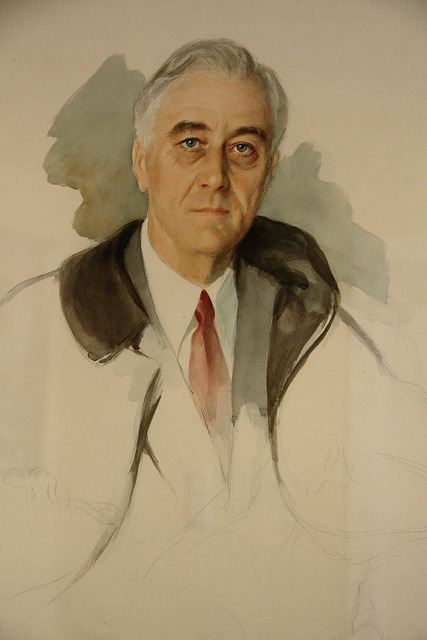
As March 1945 drew to a close, Franklin Delano Roosevelt was exhausted. At the beginning of February, Roosevelt had attended the Yalta Conference with Winston Churchill and Joseph Stalin -- a meeting which required the American President to undertake a physically punishing and extraordinarily dangerous trip halfway around the world to the Crimean Peninsula in the middle of a raging world war. At Yalta, Roosevelt’s appearance had shocked the foreign leaders and their aides. In his last face-to-face meeting with Churchill, on February 18, 1945, FDR was seen as a dead man walking. Churchill’s personal doctor, Lord Moran, told a friend that Roosevelt had “only a few months to live”.
Being President of the United States for just one term is taxing enough on a young man or a healthy man. Franklin Delano Roosevelt had been President for twelve years. He had campaigned for the Presidency and been victorious in four national elections. His Administration faced one of the greatest domestic crises in American History -- the Great Depression -- and the greatest crisis and bloodiest conflict in world history -- World War II. FDR had attacked these problems (and other issues that arose during his terms) with energy, creativity, and a relentless pursuit of victory.
A healthy and athletic man who stood nearly 6′2″ and weighed about 200 lbs. as Assistant Secretary of the Navy under Woodrow Wilson, Franklin Roosevelt had been stricken by polio in 1921. The disease robbed him of his ability to walk and, at the time, looked as if it had robbed him of a political future. He rebounded politically but physically he was never the same. Confined to a wheelchair, the muscles in his legs withered like the branches of a tree in winter. Although he could not walk under his own power, FDR taught himself to stand while wearing heavy steel braces around his shins. He needed the assistance of a muscular partner -- sometimes one of his sons, sometimes a military aide -- in order to feign the appearance of walking. Through sheer will, however, Roosevelt learned to take a few steps without anyone’s help -- a handy skill that he would show off at important campaign rallies. But as he began his unprecedented fourth term in the White House in the early months of 1945, FDR no longer had the energy to show off.
Roosevelt was as gravely ill as Lord Moran suggested. The successful 1944 Presidential campaign had severely drained his already tapped-out reservoirs of energy and stamina. His fourth inauguration was low-key, partly because it took place in the midst of war and partly due to the President’s failing health. Instead of the traditional inaugural ceremonies at the U.S. Capitol, Roosevelt took the Oath of Office at the White House and gave his brief fourth Inaugural Address from a balcony at the Executive Mansion. The famously verbose Roosevelt gave the second-shortest Inaugural Address in American History. By the time the crowd realized that he was talking he had already finished. Only George Washington’s four-sentence-long second Inaugural Address in 1793 was shorter than the address given by FDR on January 20, 1945.
FDR now looked entirely different than the man who had told the nation that “the only thing we have to fear is fear itself” in 1933. Dark circles surrounded his eyes, which seemed sunken into his skull. Since his first Inauguration, Roosevelt had lost 40-50 pounds. His hands shook so violently at times that some observers wondered how he was able to eat. He smoked constantly, but rarely finished his cigarettes. Most shocking of all, FDR no longer went to great lengths to conceal his disability. Frail and tired, he found it almost impossible to wear the heavy braces that he long wore on his crippled legs. On March 1, 1945, Roosevelt addressed a joint session of Congress on the results of his Yalta Conference with Churchill and Stalin. In an unprecedented move, the President sat in a chair on the floor of the House of Representatives and apologized to Congress, beginning his speech by saying, “I hope that you will pardon me for this unusual posture of sitting down during the presentation of what I want to say, but I know that you will realize it makes it a lot easier for me not to have to carry about ten pounds of steel around on the bottom of my legs.” It was the first time that President Roosevelt had ever publicly acknowledged his physical disability.
Twelve years of the Presidency, economic depression and war had strained Roosevelt’s health, but the 14,000-mile trip to the Yalta Conference on the Black Sea had pushed FDR to the limit. On March 30, 1945, Roosevelt arrived in Warm Springs, Georgia for a few weeks of relaxation and, hopefully, recuperation. Roosevelt loved Warm Springs. He had started visiting the small town in western Georgia in the 1920s, hoping that the warm waters from the natural mineral springs nearby would help him regain the use of his legs. When he was Governor of New York, FDR purchased a small house that he used when he visited Warm Springs. As President, the home was called the “Little White House” and although FDR only visited it sixteen times during his Presidency, many of those trips were for 2-3 weeks each. When his train pulled into Warm Springs at about 1:30 PM on March 30, 1945, many longtime residents said that things seemed different. Roosevelt looked terrible and while he waved to onlookers, it was with noticeable weakness.
The first few days in Georgia were tough. FDR was obviously ill and seemed to struggle making it through a church service on Easter Sunday. Roosevelt also avoided his beloved Warm Springs pools. Instead, the President rested, caught up on sleep, and visited with guests. The goal was for FDR to regain enough of his health to make a trip to San Francisco for the charter meeting of what would become the United Nations. At the Little White House with Roosevelt were some personal aides, military attaches, and cousins Daisy Suckley and Polly Delano. During his first week at Warm Springs, Roosevelt did very little work, dictating a few letters and reading briefings, stronger and more animated in the mornings and evenings but completely drained in the afternoon. Another goal for Roosevelt was to gain weight -- by the time he left Warm Springs, he hoped to be up to 170 lbs.
Still, there was no noticeable improvement in FDR’s health or spirits. Then, on April 9th, Lucy Mercer Rutherfurd arrived. As President Wilson’s Assistant Secretary of the Navy, Franklin D. Roosevelt had become involved in a passionate love affair with his wife’s social secretary, Lucy Mercer. It was 1918 when Eleanor Roosevelt discovered the affair between Franklin and Lucy and threatened to divorce him unless he promised never to see or speak to Lucy again. FDR agreed to the ultimatum -- an ultimatum that was strengthened by his mother’s threat to cut off his inheritance if he and Eleanor were divorced, as well as the fact that Franklin’s budding political career would be crushed if the affair was revealed. The relationship between FDR and Eleanor was never again passionate or loving after the discovery of the affair, but Eleanor kept her word and remained married to Franklin. Franklin, however, didn’t keep his word to Eleanor.
The Franklin-Lucy affair probably resumed shortly after Roosevelt’s first Inauguration in 1933. By that time, FDR and Eleanor had more of a professional relationship than a personal one. He respected the First Lady’s political viewpoints, supported her activism, used her as a sounding board, and tried to act on many of her suggestions. Personally, however, there was no passion or tenderness or intimacy between the First Couple. It was FDR and Eleanor’s daughter, Anna, who helped rekindle Franklin’s relationship with Lucy. She arranged for Lucy to visit the President in the White House when Eleanor was out of town. And on April 9, 1945, Lucy Mercer Rutherfurd was in Warm Springs, Georgia visiting President Roosevelt due to Anna Roosevelt’s invitation.
FDR was so excited to see Lucy that he didn’t wait for Lucy to make the drive all the way from Aiken, South Carolina to Warm Springs. The President and his cousin Daisy decided to meet Lucy’s car en route. At Manchester, Georgia, 85 miles away from Warm Springs, the highway rendezvous took place. FDR looked happier than he had in months as Lucy got into FDR’s car along with her friend, painter Elizabeth Shoumatoff. Lucy had brought Shoumatoff along to paint a portrait of the President -- a portrait that she hoped would be an improvement on the recent photographs that had made Roosevelt look “ghastly”.
For the next two days, Roosevelt and Lucy enjoyed their time together, going on small drives, eating happy meals, and sitting together while Shoumatoff prepared to paint the President’s portrait, studying photographs and making preliminary drawings. Daisy Suckley had the opportunity to observe the unique relationship between FDR and Lucy Mercer and also had some private conversations with the President’s longtime mistress. In her diary, Daisy recorded her thoughts about the two after she accompanied them on an automobile drive that they took: “Lucy is so sweet with F(ranklin) -- No wonder he loves to have her around -- Toward the end of the drive, it began to be chilly and she put her sweater over his knees -- I can imagine just how she took care of her husband -- She would think of little things which make so much difference to a semi-invalid, or even a person who is just tired, like F(ranklin).”
On April 12th, President Roosevelt woke up and ate a light breakfast. He had a slight chill despite the warm, humid weather that day and wore his cape draped over his shoulders throughout the early afternoon. Roosevelt did a little bit of work, reading the Atlanta newspapers and dictating some correspondence. Elizabeth Shoumatoff had set up her easel in the living room where the President worked behind a card table that served as his makeshift desk. As Shoumatoff painted, FDR continued reading, and at about 1:00 PM, Roosevelt said, “We have got just about fifteen minutes more to work.”
In the quiet of the room, Daisy Suckley thought that the President had dropped his cigarette and was searching for it because his head slumped forward suddenly. Roosevelt could barely lift his head when Daisy asked what was wrong. He placed his left hand gently against the back of his head and, in a barely audible voice, told Daisy, “I have a terrific pain in the back of my head!”
Roosevelt quickly slipped into unconsciousness as the women in the room summoned help. They called for a doctor who was staying in a cottage close to the Little White House and they helped two of FDR’s valets carry the President into the bedroom. Roosevelt’s hands and feet were ice cold, but he was still breathing. Smelling salts were administered but FDR was unresponsive. As the doctor and aides tried to help the President, Lucy Mercer Rutherfurd and Elizabeth Shoumatoff recognized the hopelessness of the situation. They also recognized the potential scandal that was possible if it was learned that the President collapsed in the presence of his longtime mistress.
Shoumatoff packed up all of her paints and the unfinished portrait she had been working on. Lucy Mercer grabbed her belongings and took one last look at her beloved Franklin. He was still alive when they left, but he was breathing laboriously and his eyes no longer recognized Lucy. Lucy and Elizabeth Shoumatoff had been on the highway back to Aiken, South Carolina for an hour when President Franklin Delano Roosevelt died in Warm Springs at 3:35 PM. The official cause of death was a cerebral hemorrhage. FDR was 63 years old.
Eleanor Roosevelt was notified of her husband’s death a few minutes after 4:00 PM. She summoned Vice President Harry Truman to the White House while he was having a drink at the U.S. Capitol with House Speaker Sam Rayburn. Truman wasn’t told why he needed to hastily come to the White House, but he knew it sounded urgent. As Truman left the Capitol, he ran into a young Congressman who questioned the Vice President about his speedy exit -- a young Congressman named Lyndon Johnson.
At the White House at 5:30 PM, Eleanor Roosevelt broke the news to the Vice President simply a directly: “Harry, the President is dead.” Truman was stunned and asked what he could do for the widowed First Lady. Eleanor smiled sadly and asked, “Is there anything we can do for you? For you are the one in trouble now.” At 7:00 PM, Chief Justice Harlan Fiske Stone administered the Oath of Office to Truman as the 33rd President of the United States.
By that time, Eleanor was on her way to Warm Springs to claim her husband’s body. At about midnight, she arrived at the Little White House in Georgia where she asked about her husband’s last hours. It was then that she learned news almost as shocking as the President’s death. Eleanor found out that FDR had been with his former mistress Lucy Mercer Rutherfurd when he was stricken. She spent 45 minutes alone with his body, picked out the clothing for his burial, but never lost her composure despite the shocks that she experienced that day.
A funeral train returned FDR’s body to Washington, D.C. the next day. Roosevelt was embalmed by morticians who found that the President’s arteries were so hardened that they could barely inject the embalming fluid into his body. FDR’s body laid in state in the East Room of the White House almost 80 years to the day that Abraham Lincoln’s body rested in the very same place following his assassination. On the 80th anniversary of Lincoln’s death -- April 15, 1945 -- Franklin Delano Roosevelt was buried in the garden of his beloved estate Hyde Park on the Hudson River in New York. Upon his death, the New York Times wrote of the deceased President:
“Men will thank God on their knees a hundred years from now that Franklin D. Roosevelt was in the White House. It was his hand, more than that of any other single man, that built the great coalition of the United Nations. It was his leadership which inspired free men in every part of the world to fight with greater hope and courage. Gone is the fresh and spontaneous interest which this man took, as naturally as he breathed air, in the troubled and the hardships and the disappointments and the hopes of little men and humble people.”
Elizabeth Shoumatoff’s Unfinished Portrait of President Roosevelt -- which she was working on when he died -- now hangs in the Little White House in Warm Springs, Georgia.
#History#Franklin D. Roosevelt#FDR#President Roosevelt#Warm Springs#FDR Library#Death of Franklin D. Roosevelt#Presidents#Elizabeth Shoumatoff
73 notes
·
View notes
Text
Sunday 10 May 1840
8 ¾
1 40/..
finish morning R10 ¼° at 10 a.m. about before breakfast at 10 ¼ to 11 – then had Mr. Besoc and then Captain Tolstoy who staid after Mr. B- and till after 1 – I had just turned all my things out of my bag and began packing before they came – all the rest of the day packing and putting away my papers etc. (to be left behind) in the top of my Moscow portmanteau and put my own dresses and A-‘s in the portmanteau to be left behind – about 8 went down to see about the kibitka packing – tis now 9 and we have not dined or had tea – Madame Latchinoff sent the translation of her voyage to Erivan by 10 this morning (before breakfast) – It seems, after all, that Mr. T- (not captain – only Lieutenant as yet) [likes] better reading than that of light travels etc. etc. his favourite work Mignards’ French revolution 4vols. 8vo. and likes Hume and Gibbon and Robertson – the black sea said B. and T. very stormy from 1 September to 1 May – short hay-cocky waves – government bought 5 steamers in London – one of 130 horse power lost – could not contend against the storm – but from 1 May to 1 September 4 months of summer the sea stormless (storms have been known in May) and beautiful – one goes from Kertch [Kerč’] to Yalta and thence to Odessa but regular post road by land – vessels have been 3 months instead of 30 hours (or 2 or 3 days with wind) from Constantinople to Odessa – B- himself was a month and all but lost – 1 ½ day from Constantinople to Trebizond – the Tcherkess pirates [?] to [?] vessels – fine day – felt queer from not having walked out for several days – Read Madame L-s’ little work after dinner – Sense well enough – French bad –
5 notes
·
View notes